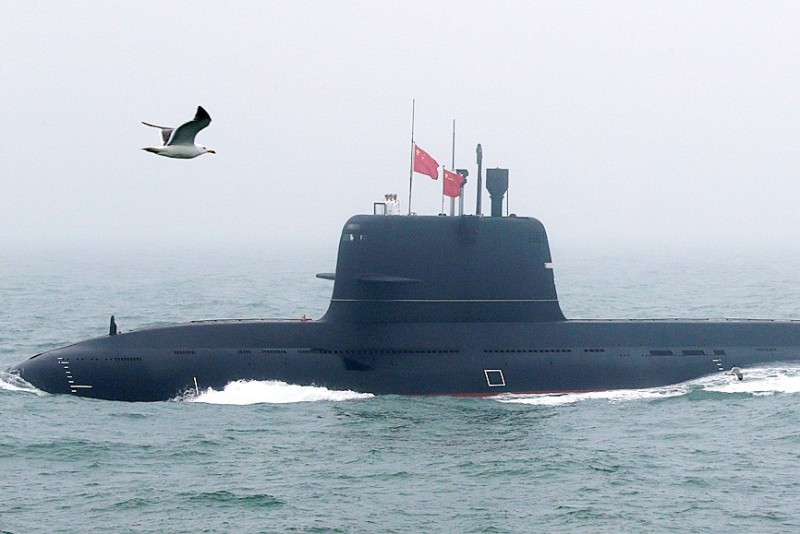《TAIPEI TIMES》Experts disagree on national defense

A Chinese submarine takes part in a naval parade off the eastern port city of Qingdao, China, to mark the 70th anniversary of the founding of the Chinese People’s Liberation Army Navy, on April 23 last year. Photo: Reuters
ARMS RACE: Two DPP lawmakers said that China’s development model differed from Taiwan’s, as it aims to become a global hegemon, while Taiwan seeks to protect itself
By Wu Su-wei and Jake Chung / Staff reporter, with staff writer
Taiwanese national defense experts are split on how Taiwan should respond to the ever-growing budget of the Chinese People’s Liberation Army (PLA), with some advocating for Taiwan to increase defense spending, while others say that little can be done.
The Legislative Yuan approved NT$358 billion (US$12.1 billion) for national defense spending across fiscal 2020, a 3.47 percent increase compared with last year, while China’s military budget this year is NT$5.4 trillion, more than 15 times that of Taiwan.
Regardless of whether the government adopts a zero-based budgeting method for national defense spending — in which all expenses are justified and approved each period — it should consider attenuating that spending toward realizing strategic and policy goals, Institute of National Defense and Security Research senior analyst Su Tzu-yun (蘇紫雲) said yesterday.
Despite the large figure, Taiwan’s military spending, compared with fiscal 1995 and adjusted for inflation based on the consumer price index, has only increased by 4 percent, he said.
He said he specifically compared spending with 1995, as that was when the third Taiwan Strait Crisis occurred, when the PLA conducted a series of missile launch exercises ahead of the nation’s first general election.
The defense budget should not be managed so conservatively, Su said.
Investments in the national defense industry help stimulate other industries and lead to increased employment, Su said, adding that a NT$100 billion investment in the national defense industry could yield 1.8 times that in benefits to the greater economy.
This could only be achieved if the government finalized the budget as a cross-ministry effort, Su said, pointing to the “five plus two” innovative industries policy as a step in the right direction.
The “five plus two” refers to the government’s plans to develop an Asian Silicon Valley, biomedical tech, green energy, industry 4.0 (robotics), and defense and aviation, as well as innovative agriculture and a “circular economy.”
Association of Strategic Foresight research fellow Chieh Jung (?仲) said the Ministry of National Defense was, in essence, already applying a zero-based budgeting model.
The ministry’s budget process is to collect estimates from every department, add it up and send it to the Directorate-General of Budgeting, Accounting and Statistics (DGBAS), he said.
The DGBAS, in accordance with the annual revenue estimate and other guiding principles set forth by the Executive Yuan, responds with a projected budget ceiling, which the ministry fine-tunes to meet its estimates, he said.
However, there is little room to fine-tune its estimates, he added.
About half of the national defense budget is taken up by personnel costs, while a portion goes toward purchasing US arms, the price of which is mostly fixed in negotiations, Chieh said.
Research and development funds comprise the rest of the budget, he said.
The National Security Council and the National Security Bureau budgets operate in the same way, Chieh added.
Separately yesterday, Democratic Progressive Party (DPP) legislators Wang Ting-yu (王定宇) and Chao Tien-lin (趙天麟) said there is no need to enter an arms race with a “warmongering” China, as President Tsai Ing-wen’s (蔡英文) administration has introduced policies to increase the quality and quantity of the nation’s armed forces.
China’s development model differs from Taiwan, as it aspires to be a global hegemon, while Taiwan only seeks to protect its citizens, Wang said, adding that the two are not comparable.
An arms race with China is out of the question, Chao said, as Taiwan cannot hope to compete, nor is it necessary.
Development in asymmetric warfare over the past few years could make up the drastic difference in defense spending, and Taiwan can receive military intelligence from its partners in the US-led Indo-Pacific strategy, he said.
People should be confident in Taiwan’s national defense capabilities, he added.
新聞來源:TAIPEI TIMES



















